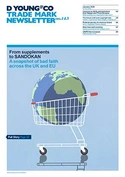IPEC finds OATLY mark not infringed by PUREOATY sign
In a recent decision the Intellectual Property Enterprise Court (IPEC) has held that various trade mark registrations owned by Oatly AB (Oatly) including the marks OATLY and OAT-LY, are not infringed by the mark PUREOATY used by the defendant Glebe Farm Foods Limited for an oat based drink.
Oatly is a well-known Swedish company which manufactures and sells oat-based drinks which are a plant-based alternative to dairy products. Its Barista Edition product is the top selling product in the dairy alternative product category. Oatly owns various trade marks for its OATLY mark and packaging, a number of which were relied on at trial. The judge focused the decision on the OATLY word mark on the basis this was the claimant’s best case and this article also focuses on this mark.
Oatly’s infringement case was based on section 10(2) (likelihood of confusion) and 10(3) (marks with a reputation) of the Trade Mark Act 1994.
In relation to the section 10(2) claim, the judge held that the marks OATY and PUREOATY had a very modest degree of similarity from a visual and phonetic perspective due to the presence of the word OAT. Conceptually the marks had some similarity in that they both referred to oats. The goods at issue were considered to be identical. When assessing likelihood of confusion the judge took into account the fact that the similarity between the OATLY and PUREOATY marks lay in the OAT element of the marks which was descriptive and which was unlikely to be given trade origin significance by consumers. Also significant was the fact that the defendant used the PUREOATY sign directly below the Glebe Farm logo on a carton which looked quite different from the Oatly carton. As a result the judge considered that no likelihood of confusion would arise in this instance.
In relation to the claim under section 10(3), the judge confirmed that Oatly’s marks had a significant and extensive distinctive character and reputation in the UK. In line with the judge’s conclusions under section 10(2), he considered there to be a very modest degree of similarity between the signs, based on the common element OAT. There was, however, some evidence showing that customers were making a link between the marks OATLY and PUREOATY marks. It then fell to the judge to consider whether any of the three types of injury - to the distinctive character or repute of the mark or unfair advantage - were present on this case.
On the issue of detriment to distinctive character, the judge found that no injury was likely to be caused because any similarity between the marks resulted from their descriptive elements. In the view of the judge, the defendant’s use of PUREOATY was unlikely to diminish the attractiveness of the OATLY brand as a badge of origin.
Similarly, there was no injury to the repute of the OATLY mark because there was no likelihood of confusion between the marks and, as such, the judge found it difficult to see how a customer complaint about the PUREOATY drink could impact Oatly.
Finally, in relation to unfair advantage, while the judge acknowledged the huge reputation of the OATLY mark, he considered that no unfair advantage was taken as there was no evidence of an intention on the part of the defendant to get close to or take advantage of the repute of the Oatly mark.
In case the judge was wrong about the above conclusions, he considered whether the defendant’s use of the PUREOATY mark would have been with due cause, given the distinctive nature of the word OAT. In relation to detriment to the distinctive character or repute of the mark, the judge considered that the defendants actions would have been with due cause. However, if unfair advantage had been found then the judge confirmed that the defendant’s actions would have been without due cause.
Oatly’s claim for passing off failed on the basis no likelihood of confusion had been found between the marks.
In short
This case is a reminder that where a trade mark has some descriptive elements, the particular context of use will be important in an infringement claim.
Case details at a glance
Jurisdiction: United Kingdom
Decision level: IPEC
Parties: Oatly AB v Glebe Farm Foods Limited
Date: 05 August 2021
Citation: [2021] EWHC 2189 (IPEC)

